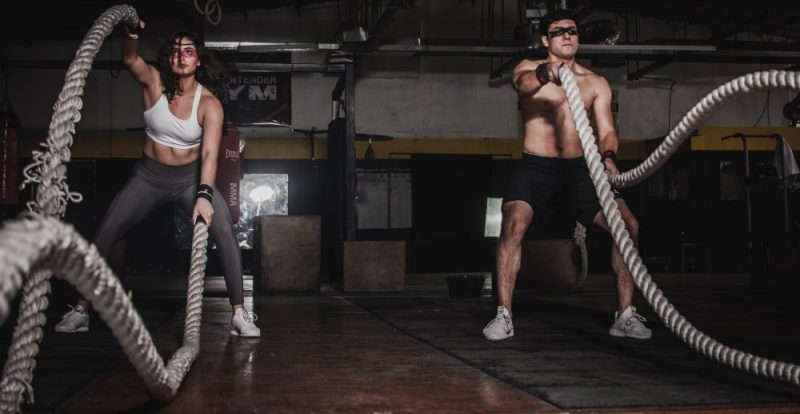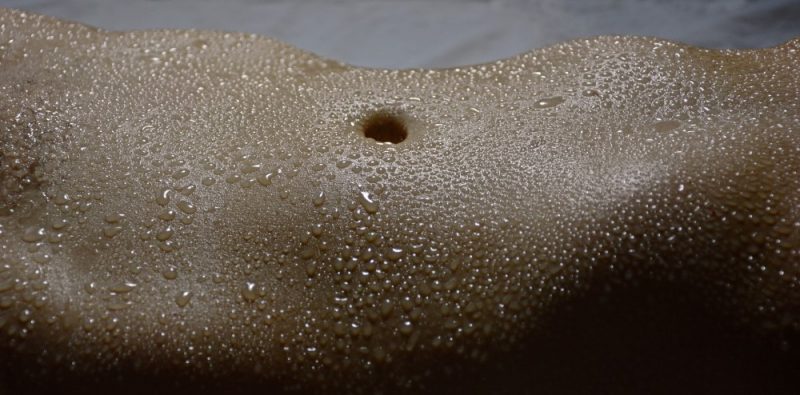Our body is a sophisticated construct with innumerable protective mechanisms.
Sweating is one of them.
Our body has two to four million sweat glands.
The highest density of glands is found on the feet, the lowest in lower legs.
Overall, the sweat glands produce between 0.5 to 1 liter of sweat daily. During physical activity, the amount of sweat is significantly increased.

Why are We Sweating?
Why are we sweating at all?
With every movement, the body produces heat. To not overheat inside, we need a cooling system.
This is what the sweat glands are for.
When we feel hot, we start sweating and the body cools down. This is how body temperature is regulated. Sweat cools the body.
Influence of Training Condition on Sweating
Partly you hear and read about the fact that athletic people sweat more. Others say that unsportsmanlike persons would transpire more. What’s wrong?
Several scientific studies researched exactly that.
Same VO2 Max
In most of the studies comparing the sweat production of fit and unfit individuals, the VO2max was used as a normalization parameter.
If trained and untrained people run at 60% of their VO2max for one hour, then the trained will sweat more on average.
If both subjects get to 60% of VO2max work, then the higher performance group also provides higher absolute power.
On an ergometer, for example, this would mean that this group is driving at a higher resistance. Or while walking, the subjects of this group would run at a higher speed.
The higher absolute power results in more metabolic processes, which in turn produce heat. This heat production is the deciding factor that causes sweat production.
Same Load
The load is determined based on physical parameters such as the running speed. For example, the same load means that all subjects run at 10 km / h for one hour.
Studies have shown that athletes with higher endurance performance, at the same given load, have lower heat production and thus less sweat loss.
The better-trained people sweat less.
They have to do less work with the same performance due to higher mobility than someone who is untrained.
Thus, in the case of the same load, less metabolic processes take place, which results in lower heat production and, consequently, a lower need for cooling due to perspiration.

Same Body Temperature
There are also studies in which the body temperature was equated.
During endurance exercise, such as on an ergometer, body temperature was continually set to a certain value.
If the temperature dropped below a certain threshold, the subjects had to drive faster or the resistance was increased.
If the temperature rose above a certain level, the participants should drive slower or the resistance was lowered so that the body temperature always stayed in a predetermined range.
The trained athletes achieve higher performance at the same body temperature. They either drive faster or can work against a higher resistance.
At the same body temperature, there can be no difference in sweat production between persons with high or low endurance. This leads to the assumption that body temperature is the decisive factor for sweat production.
Sporty People Sweat Faster
The more trained a person is, the faster the sweat production starts.
This is the result of years of training. The body reacts faster to the need for cooling and regulates more quickly by initiating perspiration.
Sporty People Sweat more Effectively
In trained athletes, it has been observed that the type of sweating differs from untrained people.
Someone who does a lot of sports also trains his sweat glands.
Through training, the sweat glands are “trained” to flush out less of the important nutrients.
The sweat glands produce the optimum amount of sweat, just enough to cool your body down.
This ensures the best evaporation and thus the optimal cooling effect.
In the case of the untrained, the sweat glands sometimes overproduce sweat.
They produce too much sweat and drops are formed. Large drops of sweat can not evaporate. Thus, the athlete loses important fluid, which is important for maintaining performance.
Sporty people sweat therefore more effective.
Why does Sweat Smell?
Smell occurs only when the sweat comes into contact with bacteria.
These decompose some components of the sweat and create a typical smell. Bacteria in clothing can also make you smell sweat faster.
It is advisable to wear breathable clothing or to use a hygiene rinse while washing. Even body parts that are comparatively hairy, such as the armpits or the genital area, can contribute to smelly sweat.
You should consider a shave.
The individual body smell is also influenced by the fluid production of the sweat glands. The body smell makes us decide subconsciously, whether we like someone or not.
Sympathy and love are not only through the stomach – but also through the nose.
Conclusion
Sweat has a vital function in regulating body temperature and is absolutely necessary to protect our body. Whether someone sweats a lot or a little depends in part on his level of training and endurance.
However, anthropometric factors such as body mass or body surface have a greater influence on sweat production.
The higher the body mass or the larger the body surface area, the more metabolic processes occur during physical activity.
This results in higher heat production and thus a larger amount of the separated sweat to compensate for this.




